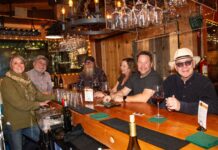Most articles on the Idyllwild Town Crier website are available only to members.
If you are a member, LOG IN HERE!
Sign up below or call the Town Crier office at (951) 659-2145 to become a member.
MEMBERSHIP BENEFITS
- Subscriptions to both printed and online issues of the Town Crier.
- Nice-looking "Town Crier Member" window decals, which we very much hope you will display so as to encourage others to join us.
- Recognition of your Membership in the Town Crier, unless you request anonymity.
- Invitations to what we hope will be the annual Town Crier Membership Party.
- And most important and valuable of all: You will receive the satisfaction and pleasure of knowing that you are doing your part to support a real newspaper on our Hill for the benefit of our entire community.
Already a member?
LOG IN HERE
NOTE: An online service charge of 3% is added. To avoid this charge, please call our office, stop in or mail a check and completed membership form to:
Idyllwild Town Crier
P.O. Box 157
Idyllwild, CA 92549
The Town Crier is NOT an official "nonprofit organization" (for practical editorial reasons it could not be). Therefore, your membership contributions are NOT tax-deductible.
And we know our members appreciate that we cannot allow the fact of their memberships to control the paper's ongoing editorial policies.
If you previously had an uncompleted subscription before we went "free to the Hill," or if you have an off-Hill subscription now, you may contact Becky for credit against your new Membership.
Membership Levels
Angels - $1,000+ (unlimited) annually
If you would like to contribute an amount above $1,000 (thank you!), please contact our office or mail a check to the above address.
Heroes - $1,000 annually or $83.33 per month
(Note: a 3% fee is added; PLEASE ALLOW 2-3 BUSINESS DAYS FOR ONLINE ACCOUNT ACTIVATION)
Hero Annual Membership |
Hero Monthly Membership |
Patrons - $500 annually or $41.67 per month
(Note: a 3% fee is added; PLEASE ALLOW 2-3 BUSINESS DAYS FOR ONLINE ACCOUNT ACTIVATION)
Patron Annual Membership |
Patron Monthly Membership |
Sponsors - $250 annually or $20.83 per month
(Note: a 3% fee is added; PLEASE ALLOW 2-3 BUSINESS DAYS FOR ONLINE ACCOUNT ACTIVATION)
Sponsors Annual Membership |
Sponsors Monthly Membership |
Sustaining Readers - $100 annually
(Note: a 3% fee is added; PLEASE ALLOW 2-3 BUSINESS DAYS FOR ONLINE ACCOUNT ACTIVATION)
Due to a recent trend of start and stop subscriptions, we can no longer offer the monthy pay option for the Sustaining Readers membership.
Sustainer Annual Membership |







